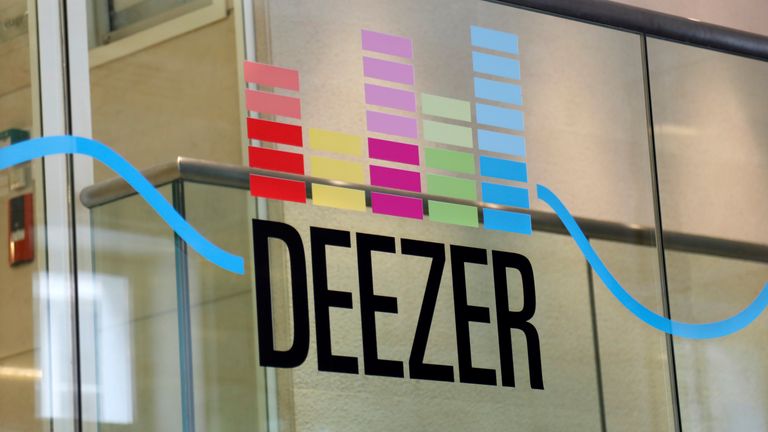Do you care if the music you’re listening to is artificially generated?
That question – once the realm of science fiction – is becoming increasingly urgent.
An AI-generated country track, Walk My Walk, is currently sitting at number one on the US Billboard chart of digital sales and a new report by streaming platform Deezer has revealed the sheer scale of AI production in the music industry.
Deezer’s AI-detection system found that around 50,000 fully AI-generated tracks are now uploaded every day, accounting for 34% of all daily uploads.
The true number is most likely higher, as Deezer’s AI-detection system does not catch every AI-generated track. Nor does this figure include partially AI-generated tracks.
In January 2025, Deezer’s system identified 10% of uploaded tracks as fully AI-generated.
Since then, the proportion of AI tracks – made using written prompts such as “country, 1990s style, male singer” – has more than tripled, leading the platform’s chief executive, Alexis Lanternier, to say that AI music is “flooding music streaming”.
‘Siphoning money from royalty pool’
What’s more, when Deezer surveyed 9,000 people in eight countries – the US, Canada, Brazil, UK, France, Netherlands, Germany and Japan – and asked them to detect whether three tracks were real or AI, 97% could not tell the difference.
That’s despite the fact that the motivation behind the surge of AI music is not in the least bit creative, according to Deezer. The company says that roughly 70% of fully AI-generated tracks are what it calls “fraudulent” – that is, designed purely to make money.
“The common denominator is the ambition to boost streams on specific tracks in order to siphon money from the royalty pool,” a Deezer spokesperson told Sky News.
“With AI-generated content, you can easily create massive amounts of tracks that can be used for this purpose.”
The tracks themselves are not actually fraudulent, Deezer says, but the behaviour around them is. Someone will upload an AI track then use an automated system – a bot – to listen to a song over and over again to make royalties from it.
Even though the total number of streams for each individual track is very low – Deezer estimates that together they account for 0.5% of all streams – the work needed to make an AI track is so tiny that the rewards justify the effort.
Are fully-AI tracks being removed?
Deezer is investing in AI-detection software and has filed two patents for systems that spot AI music. But it is not taking down the tracks it marks as fully-AI.
Instead it removes them from algorithmic recommendations and editorial playlists, a measure designed to stop the tracks getting streams and therefore generating royalties, and marks the tracks as “AI-generated content”.
“If people want to listen to an AI-generated track however, they can and we are not stopping them from doing so – we just want to make sure they are making a conscious decision,” the Deezer spokesperson says.
Read more from Sky News:
How Elon Musk is boosting the British right
The extraordinary impact of a crime on UK growth
Concerns about artists’ livelihoods
Deezer’s survey found that more than half (52%) of respondents felt uncomfortable with not being able to tell the difference between AI and human-made music.
“The survey results clearly show that people care about music and want to know if they’re listening to AI or human-made tracks or not,” said the company’s boss Alexis Lanternier.
“There’s also no doubt that there are concerns about how AI-generated music will affect the livelihood of artists.”
Earlier this year, more than 1,000 musicians – including Annie Lennox, Damon Albarn and Kate Bush – released a silent album to protest plans by the UK government to let artificial intelligence companies use copyright-protected work without permission.
A recent study commissioned by the International Confederation of Societies of Authors and Composers suggested that generative AI music could be worth £146bn a year in 2028 and account for around 60% of music libraries’ revenues.
By this metric, the authors concluded, 25% of creators’ revenues are at risk by 2028, a sum of £3.5bn.



